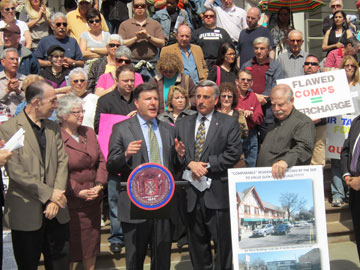Statement by Assemblyman David I. Weprin on Co-Op Assessments
As many of you know, The New York City Dept. of Finance has determined it is appropriate to raise the single-year impact of final assessment roll in Class 2 by 50%.
Throughout the course of this debate over the Department of Finance’s decision to raise assessment values for Class 2 Cooperative units, I have expressed my strong concern and opposition. Co-op owners have been unfairly targeted by the Department. Many residents of Co-op buildings are lower-income seniors and working families who simply can not afford these dramatically higher property taxes. Class 1 properties are valued by the Finance Department on the sales of other Class 1 properties (one-family and two family homes). Class 2 properties, which include rentals, are valued based on the incomes and costs reported by rental-property owners. As we know, when assessing Co-ops, the Department, looks for comparables (such as location, size, age, and use) to help determine the market value of rent per square foot and then apply those rates to the Co-op.
Last year, many of the Co-op associations located in my district, including but not limited to Glen Oaks Village, Estates at Bayside, Hilltop, Alley Pond and Windsor Park, faced between 60%-85% assessed property increases. The additional assessment cap and the final roll for Class 2 by a cap of 50% is another steep and unfair burden to place on many of my constituents.
Clearly, it makes sense to classify Class 2 cooperative properties as Class 1. Many cooperative share-holders in my district reside in the units as their primary residence; their homes and they are owner occupied. Classifying cooperative apartments as Class 2 or rental property casts the assumption that these units are investment properties and not being utilized as primary residences. In my district; as well as city wide, this is not the case. Therefore the assessments applied to these units should reflect such usage. I am proud to announce that I have introduced Assembly Bill Number A6684, which relates to classifying certain property held in cooperative form as Class 1 properties for assessment purposes. This bill’s enactment will redefine the classification of co-ops for the purposes of property taxes. The passage of this bill will result in a reduction of property taxes for owner-occupied cooperatives by capping increases in assessments at no more than 6% each year or more than 20% in five years.
On May 1, I join with Assemblyman Ed Braunstein, State Senator Toby Ann Stavisky, Council Member Mark Weprin, and local organizers to protest these unjust assessments. On May 2nd, I testified before the City Council to respectfully ask the Council to assist in encouraging the Finance Department to reconsider their assessment position and to help advocate for those cooperative owners who will be unfairly subjected to a major property tax burden if the Department goes forward with its recommended assessment plan.
We all need to continue to fight for our community’s residents, so that we many continue to keep our elderly and working-class citizens in their homes and communities.

